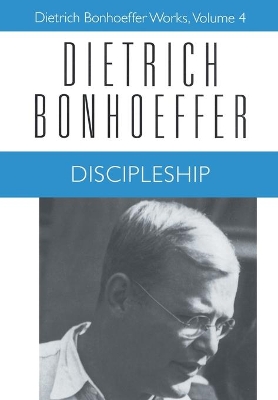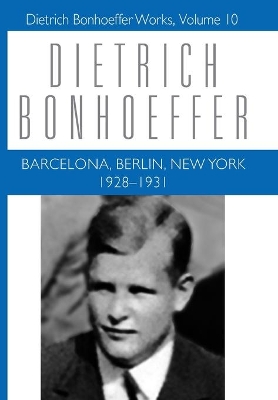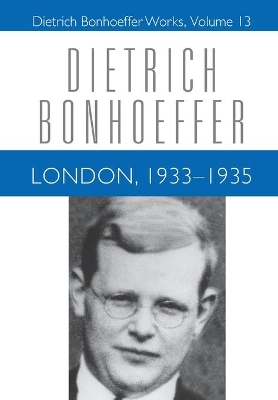Dietrich Bonhoeffer Works
17 primary works • 26 total works
v. 8
Despite Dietrich Bonhoeffer's earlier theological achievements and writings, it was his correspondence and notes from prison that electrified the postwar world six years after his death in 1945. The materials gathered and selected by his friend Eberhard Bethge in Letters and Papers from Prison not only brought Bonhoeffer to a wide and appreciative readership, especially in North America, they also introduced to a broad readership his novel and exciting ideas of religionless Christianity, his open and honest theological appraisal of Christian doctrines, and his sturdy, if sorely tried, faith in face of uncertainty and doubt.
This splendid volume, in many ways the capstone of the Dietrich Bonhoeffer Works, is the first unabridged collection of Bonhoeffer's 19431945 prison letters and theological writings. Here are over 200 documents that include extensive correspondence with his family and Eberhard Bethge (much of it in English for the first time), as well as his theological notes, and his prison poems. The volume offers an illuminating introduction by editor John de Gruchy and an historical Afterword by the editors of the original German volume: Christian Gremmels, Eberhard Bethge, and Renate Bethge.
"Then came the crisis of 1933." This is Bonhoeffer's own phrase in a letter that documents a turning point in his own life as well as that of the nation. Of Bonhoeffer's own life at this time, his biographer writes, "The period of learning and roaming" from 1928 until 1931 "had come to an end" as the young lecturer, age 26, began to teach "on a faculty whose theology he did not share" and to preach "in a church whose self-confidence he regarded as unfounded." Bonhoeffer was becoming part of a society "that was moving toward political, social, and economic chaos."
Events moved quickly at the onset of 1933 in Berlin. In only one hundred days the path was cleared by the German Parliament and the Nazi Party for the establishment of the fascist dictatorship. These one hundred days, as well as the preceding and succeeding months, are reflected in the materials in this volume: in letters, in sermons, in Bonhoeffer's university teaching, in manifestos and a church confession, and in his proactive engagement in the developing church struggle. The vast majority of these are translated here for the first time.
v. 4
"Cheap grace is the mortal enemy of our church. Our struggle today is for costly grace." And with that sharp warning to his own church, which was engaged in bitter conflict with the official nazified state church, Dietrich Bonhoeffer began his book Discipleship (formerly entitled The Cost of Discipleship). Originally published in 1937, it soon became a classic exposition of what it means to follow Christ in a modern world beset by a dangerous and criminal government. At its center stands an interpretation of the Sermon on the Mount: what Jesus demanded of his followersand how the life of discipleship is to be continued in all ages of the post- resurrection church.
"Every call of Jesus is a call to death," Bonhoeffer wrote. His own life ended in martyrdom on April 9, 1945.
Freshly translated from the German critical edition, Discipleship provides a more accurate rendering of the text and extensive aids and commentary to clarify the meaning, context, and reception of this work and its attempt to resist the Nazi ideology then infecting German Christian churches.
v. 10
The period 1928 to 1931, whichfollowed completion of his dissertation, was formative for Bonhoeffer's personaland pastoral and theological direction.Almost all of these nine hundred pagesof writings appear in English herefor the first time. They document theintense four-year period that includedpreparation of his postdoctoral thesis;a vicarage in Barcelona; occasionallectures; his postdoctoral academicyear at Union Theological Seminary;travel around the United States, Cuba, and Mexico; and his re-entry into theGerman academic and ecclesial scene.
v. 9
The first of the chronological volumes in this acclaimed critical edition of Bonhoeffer's work gathers his one hundred earliest letters and journals from after the First World War through his graduation from Berlin University. It also contains his early theological writings up to his dissertation. These seventeen works include, for example, works on the patristic period for Adolf von Harnack, on Luther's moods for Karl Holl, on biblical interpretation for Professor Reinhold Seeberg, as well as essays on the church and eschatology, reason and revelation, Job, John, and even joy. Rounding out this picture of Bonhoeffer's nascent theology are his sermons from the period, along with his lectures on homiletics, catechesis, and practical theology.
In translation for the first time, these writings show Bonhoeffer as pastor and theologian alert to his times and developing the formative themes of his religious worldview.
v. 13
The wealth of this material, says editor Keith Clements, allows us to experience a dramatic slice of this history and see the many and complex facets of Dietrich Bonhoeffer's personality.





